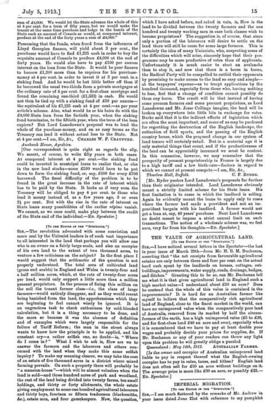IMPERIAL MIGRATION.
[To THE EDITOR OF THE "SPECTATOR.")
SIR,—I am much flattered by the remarks of Mr. Andrew in your issue dated June 21st with reference to my pamphlet "Town Lads on Imperial Farms," and I hope that the Imperially-minded of your readers will either support the movement he mentions for placing Poor Law children in the Dominions, or that in which I am interested for assisting our surplus working lads who have not so qualified to proceed to other portions of His Majesty's Empire where certain work is guaranteed them by the Governments in question. Although most of my correspondents have expressed their entire sym- pathy with the statement which appears over my signature in the Spectator of June 5th, some gentlemen have written to say that they consider that what I said about the reasons for the apathy of some Boards of Guardians towards Imperial migration was unjust. I can only add that I have since been reading the Minutes of Evidence of the Dominions Royal Commission, in which the following occurs:-
" Q. 3,406. CHAIRMAN : Why do they (the Guardians) exercise their powers so seldom ? '
EARL GREY : ' Well, I think it is more a question of ignorance. Semetimes improper motives come in. They do not like to get rid of the little patronage it gives them in keeping children within the area of their own jurisdiction.'"
It would therefore appear that I am sinning (if at all) in good company.
Mr. John Burns stated at the same inquiry that there were about 10,000 children in the workhouses who were eligible for migration; and the Canadian Government have offered to
receive about 25,000 more such children each year than are sent I Earl Grey has shown how carefully the selection of the foster-parents and the supervision of the children is carried out by the Canadian officials, and Mr. Burns's Annual Report as President of the Local Government Board emphasizes this.
When we remember that the final cost of the migration of a child is less than the expense of its Poor Law maintenance here for one year, it is obvious that those Guardians must have some other axe to grind who shut their eyes to the possi- bilities offered by the Empire to the pauper children of whom they are (nominally) the Guardians. I have records of actual instances of the ignorance of Guardians with regard to their own powers in migration ; of Guardians refusing to assist families to where work awaited them and they could be self- supporting overseas, although some of them were already a public charge in the workhouse ; of their objections to losing their own supplies of cheap labour ; and of their abuse of their powers of patronage, which would not have been possible had the carpus rile of the paupers been removed.
I am myself about to send out next week a party of boys to Victoria under Government auspices who have been in workhouse schools, but whose wages at the age of from seven- teen to nineteen are barely sufficient to support them. I have bad, therefore, to raise the money privately for thus carrying out the work that the Guardians ought to have executed years ago. If we were to send out more boys we should enable several of the tens of thousands of able-bodied paupers now supported on the rates to be employed as messengers, dish washers, lift minders, and in other situations which are now filled by the boys who have not the means to get to other parts of the Empire. Thus cheap labour is provided at the ratepayers' expense. The time is coming when the British public will realize that Imperial migration is not only a national duty, which may entail some sacrifice, but is also a saving on the rates, to say nothing of the manhood of the, people, in years to come. There ought to be no philanthropic homes for workers, whether boys or others, no pauperizing clothing, boots, breakfast, and similar efforts. A man ought to be able by his own efforts to provide for his own family's nee& by the fruit of his labour, and the day when this will be possible will be brought nearer as each party proceeds overseas and thus enables the Empire's population to be better die-
33 Oriental Street, Poplar, E.



















































 Previous page
Previous page